#paradise lost quotes
Text
Sometimes two people need to fall apart to realize how much they need to fall back together.
-Colleen Hoover

#colleen hoover#paradise lost quotes#quotes#love#lit#literate roleplay#literature quotes#literature#gothic poetry#cat stevens#fashion#poetry#poetry quotes#book quotes#edgar allan poe#hp lovecraft quotes#lovers#hot kiss#kiss#30 seconds to mars quotes#music#lol#lovely#kisses#art#edgar allan poe quotes#music lyrics
4 notes
·
View notes
Text
"I think Homer outwits most writers who have written on the War [fantasy archetype], by not taking sides.
The Trojan war is not and you cannot make it be the War of Good vs. Evil. It’s just a war, a wasteful, useless, needless, stupid, protracted, cruel mess full of individual acts of courage, cowardice, nobility, betrayal, limb-hacking-off, and disembowelment. Homer was a Greek and might have been partial to the Greek side, but he had a sense of justice or balance that seems characteristically Greek — maybe his people learned a good deal of it from him? His impartiality is far from dispassionate; the story is a torrent of passionate actions, generous, despicable, magnificent, trivial. But it is unprejudiced. It isn’t Satan vs. Angels. It isn’t Holy Warriors vs. Infidels. It isn’t hobbits vs. orcs. It’s just people vs. people.
Of course you can take sides, and almost everybody does. I try not to, but it’s no use; I just like the Trojans better than the Greeks. But Homer truly doesn’t take sides, and so he permits the story to be tragic. By tragedy, mind and soul are grieved, enlarged, and exalted.
Whether war itself can rise to tragedy, can enlarge and exalt the soul, I leave to those who have been more immediately part of a war than I have. I think some believe that it can, and might say that the opportunity for heroism and tragedy justifies war. I don’t know; all I know is what a poem about a war can do. In any case, war is something human beings do and show no signs of stopping doing, and so it may be less important to condemn it or to justify it than to be able to perceive it as tragic.
But once you take sides, you have lost that ability.
Is it our dominant religion that makes us want war to be between the good guys and the bad guys?
In the War of Good vs. Evil there can be divine or supernal justice but not human tragedy. It is by definition, technically, comic (as in The Divine Comedy): the good guys win. It has a happy ending. If the bad guys beat the good guys, unhappy ending, that’s mere reversal, flip side of the same coin. The author is not impartial. Dystopia is not tragedy.
Milton, a Christian, had to take sides, and couldn’t avoid comedy. He could approach tragedy only by making Evil, in the person of Lucifer, grand, heroic, and even sympathetic — which is faking it. He faked it very well.
Maybe it’s not only Christian habits of thought but the difficulty we all have in growing up that makes us insist justice must favor the good.
After all, 'Let the best man win' doesn’t mean the good man will win. It means, 'This will be a fair fight, no prejudice, no interference — so the best fighter will win it.' If the treacherous bully fairly defeats the nice guy, the treacherous bully is declared champion. This is justice. But it’s the kind of justice that children can’t bear. They rage against it. It’s not fair!
But if children never learn to bear it, they can’t go on to learn that a victory or a defeat in battle, or in any competition other than a purely moral one (whatever that might be), has nothing to do with who is morally better.
Might does not make right — right?
Therefore right does not make might. Right?
But we want it to. 'My strength is as the strength of ten because my heart is pure.'
If we insist that in the real world the ultimate victor must be the good guy, we’ve sacrificed right to might. (That’s what History does after most wars, when it applauds the victors for their superior virtue as well as their superior firepower.) If we falsify the terms of the competition, handicapping it, so that the good guys may lose the battle but always win the war, we’ve left the real world, we’re in fantasy land — wishful thinking country.
Homer didn’t do wishful thinking.
Homer’s Achilles is a disobedient officer, a sulky, self-pitying teenager who gets his nose out of joint and won’t fight for his own side. A sign that Achilles might grow up someday, if given time, is his love for his friend Patroclus. But his big snit is over a girl he was given to rape but has to give back to his superior officer, which to me rather dims the love story. To me Achilles is not a good guy. But he is a good warrior, a great fighter — even better than the Trojan prime warrior, Hector. Hector is a good guy on any terms — kind husband, kind father, responsible on all counts — a mensch. But right does not make might. Achilles kills him.
The famous Helen plays a quite small part in The Iliad. Because I know that she’ll come through the whole war with not a hair in her blond blow-dry out of place, I see her as opportunistic, immoral, emotionally about as deep as a cookie sheet. But if I believed that the good guys win, that the reward goes to the virtuous, I’d have to see her as an innocent beauty wronged by Fate and saved by the Greeks.
And people do see her that way. Homer lets us each make our own Helen; and so she is immortal.
I don’t know if such nobility of mind (in the sense of the impartial 'noble' gases) is possible to a modern writer of fantasy. Since we have worked so hard to separate History from Fiction, our fantasies are dire warnings, or mere nightmares, or else they are wish fulfillments."
- Ursula K. Le Guin, from No Time to Spare, 2013.
#ursula k. le guin#homer#quote#quotations#the iliad#trojan war#storytelling#fantasy#fiction writing#war#conflict#tragedy#john milton#paradise lost#greek mythology
2K notes
·
View notes
Photo

John Milton, Paradise Lost, Book 1
[originally published 1667]
#truer words were never spoken#john milton#literature#paradise lost#words#quotes#academia#dark academia#quote#lit#heaven#hell#books#books and libraries#reading#quote of the day#bookworm#book quotes#prose#booklr#bibliophile#excerpt
3K notes
·
View notes
Text

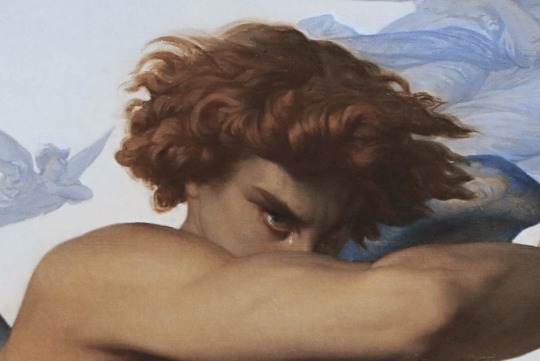
He... he did the thing. The first time you meet (with a knife to your throat).
#baldur's gate 3#bg3#astarion#bg3 astarion#astarion bg3#baldurs gate astarion#baldur's gate iii#astarion ancunin#dnd#bg3 spoilers#the fallen angel#alexandre cabanel#lucifer#I am platonically in love with every artist and cosplayer that uses this painting for Astarion#“Abashed the devil stood and felt how awful goodness is and saw Virtue in her shape how lovely: and pined his loss”#From John Milton's 'Paradise Lost'#Which is the work that the Fallen Angel was inspired by#The quote is wildly out of context but I felt it was similar to Astarion in The Last Unicorn way
222 notes
·
View notes
Text

I kept looking at her like she was a dream come true, I couldn't control my smile, I wanted the world to stop....
#smiles#my thoughts#her#cute smile#beautiful smile#lost in paradise#lost in your eyes#lost in love#in love#love quotes#eroticlover#words#intimacy#beautiful mind#mind body soul
83 notes
·
View notes
Text




John Milton, Paradise Lost/ JRR Tolkien, The Return of the King/ William Shakespeare, Richard III/ Mary Shelley, Frankenstein
#quotes#fallen angels#John milton#paradise lost#jrr tolkien#the return of the king#william shakespeare#Richard III#mary shelley#frankenstein
99 notes
·
View notes
Text
Reunion Chapter 11 is done.

I knew I was going to have a hard time writing a note on this one, but man. This series has been a constant in my life through nine years and multiple earth-shattering life changes, and I'm so proud to have finally seen it to the end. But all the same...man. I don't know what to say.
I recently rediscovered my plans from 2015 for a oneshot prequel from Roger's POV, so this may not entirely be the end of the road. But as far as Light and Near's ongoing adventures go, I think this is the proper place to say goodbye. Thank you to everyone who has followed these stories, whether you've been reading them from the start or just discovered them today. Thank you for the comments, the fanart, the shitposts, the playlists, the cosplays, the TV Tropes entries, and the million other little signs of love you've shown my emotionally constipated fictional sons. Even if we've never spoken, I appreciate it all more than you know.
I hope this ending is every bit as satisfying to you as writing it felt for me. It's been an incredible ride.
Chapter Summary: "Long is the way and hard, that out of Hell leads up to Light." ~~John Milton, Paradise Lost
read it on ff.net || read it on AO3
#fanfiction#death note#light yagami#nate river#I am experiencing shrimp emotions#time to go listen to moon river and feel sad#also if you're wondering whether I chose a Paradise Lost quote here because that's the last book Roger ever gave Light#the answer is yes
30 notes
·
View notes
Text

escapril day 22: desire
[ from the doing of first's disobedience to the many that followed within. the original sin paved the way for numerous to follow in it's wake. both visible and hidden. in all its methods and forms. stealing goods, money, food or someone's part of better half. everything arises from a disastrous want. to bow before desire and make yourself vulnerable to tempestuous remarks. ]
#words#prose#poetry#writer#writing#writings#desire#brown academia#escapril#escapril 2024#napowrimo#napowrimo 2024#excerpts#selections#quotes#fragments#poetic#typography#lit#original sin#paradise lost#literature#dark academia#light academia
22 notes
·
View notes
Text
“What reinforcement we may gain from hope,
If not, what resolution from despair?”
- Satan, Milton’s Paradise Lost (Book 1)
#paradise lost#books and reading#writing#quotes#dark academia#books#long reads#creative writing#poetry#lifestyle#life quotes#inspiration#light academia#john milton#english#literature#book quotes
24 notes
·
View notes
Text
What is dark within me, illumine.
John Milton, Paradise Lost
#book quotes#john milton#paradise lost#english literature#classic literature#books and libraries#books and reading#poetry
279 notes
·
View notes
Text
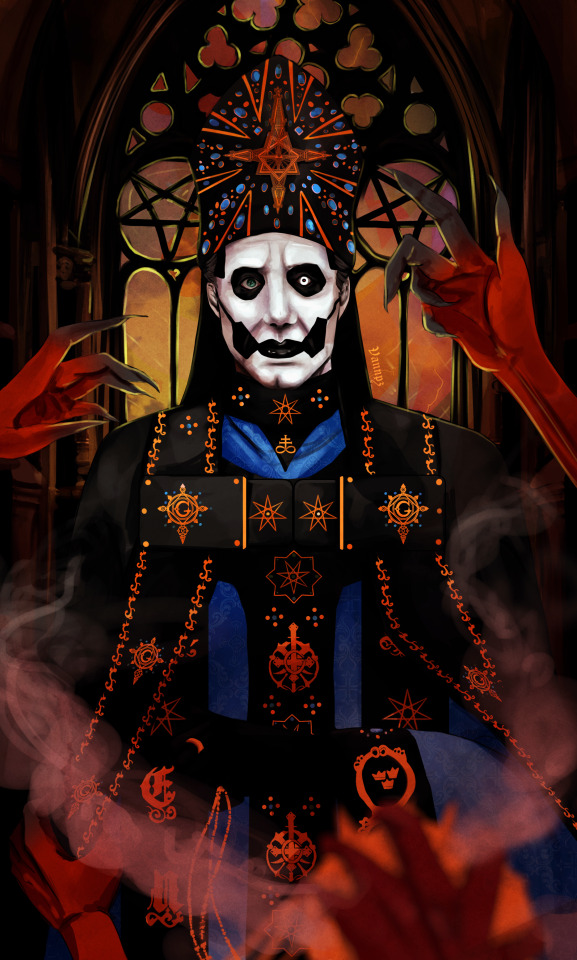
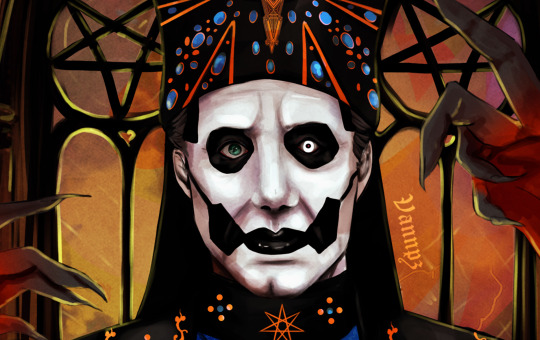
"Meglio regnare all'inferno che servire in paradiso"
#myart#finally finished!#papaemeritusiv#papa emeritus iv#cardinal copia#the band ghost#ghost#fanart#paradise lost quote
242 notes
·
View notes
Text
How can I live without thee, how forego
Thy sweet converse, and love so dearly joined,
To live again in these wild woods forlorn?
Should God create another Eve, and I
Another rib afford, yet loss of thee
Would never from my heart; no, no, I feel
The link of nature draw me: flesh of flesh,
Bone of my bone thou art, and from thy state
Mine never shall be parted, bliss or woe.
However, I with thee have fixed my lot,
Certain to undergo like doom; if death
Consort with thee, death is to me as life;
So forcible within my heart I feel
The bond of nature draw me to my own,
My own in thee, for what thou art is mine;
Our state cannot be severed, we are one,
One flesh; to lose thee were to lose myself.
John Milton, Paradise Lost
#john milton#paradise lost#dark academia#romantic academia#chaotic academia#bookish#booklover#dark academia aesthetic#academia#books & libraries#books#booklr#classic literature#classical academia#classic academia#book quotes#literature quotes#poetry
52 notes
·
View notes
Photo

John Milton, Paradise Lost, Book 1
[originally published 1667]
#john milton#literature#words#paradise lost#quotes#academia#dark academia#quote#lit#books#books and libraries#reading#quote of the day#bookworm#book quotes#prose#booklr#bibliophile#excerpt
628 notes
·
View notes
Text
Stupid tumblr not letting me find the post I know I reblogged several months ago now that it's suddenly stuck in my head.
21 notes
·
View notes
Photo
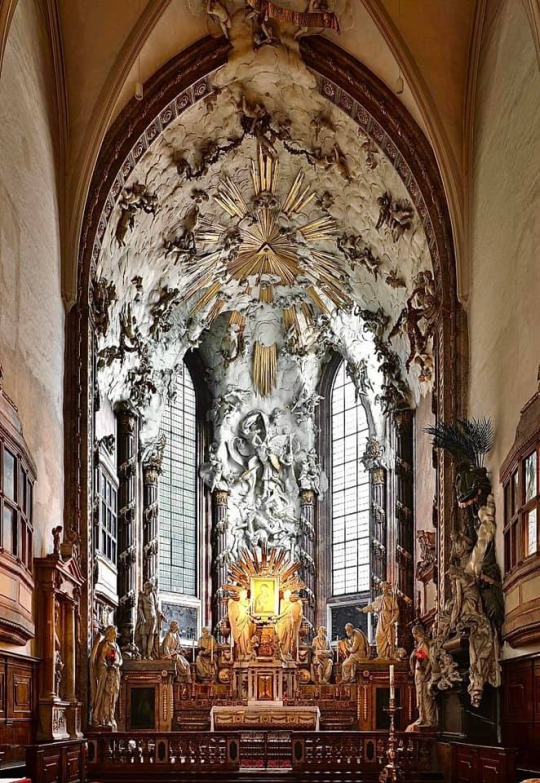

Me miserable! Which way shall I fly
Infinite wrath and infinite despair?
Which way I fly is hell; myself am hell;
And in the lowest deep a lower deep,
Still threat'ning to devour me, opens wide,
To which the hell I suffer seems a heaven.
- John Milton, Paradise Lost (1667)
Fall of the Angels sits at the high altar of Saint Michael’s Church, Vienna. The high altar was designed in 1782 by Jean-Baptiste d’Avrange. But the monumental stucco alabaster Rococo sculpture Fall of the Angels was created by sculptor Karl Georg Merville. It was the last major Baroque work completed in Vienna in 1782.
It represents a cloudburst of angels and cherubs, falling from the ceiling towards the ground. In the centre the archangel Michael raises a flaming dart against the angelic rebels. Revelation 12:7 calls their leader "the dragon," but here all the fallen angels are represented anthropomorphically.
Saint Michael's Church is one of the oldest churches in Vienna, Austria, and also one of its few remaining Romanesque buildings. Dedicated to the Archangel Michael, St. Michael's Church is located at Michaelerplatz across from St. Michael's Gate at the Hofburg Palace. St. Michael's used to be the parish church of the Imperial Court, when it was called Zum Heiligen Michael.
#milton#john milton#quote#poem#literature#paradise lost#sculpture#church#fall of the angels#st michael's church#christianity#vienna#austria#aesthetics#beauty#art
137 notes
·
View notes
Text
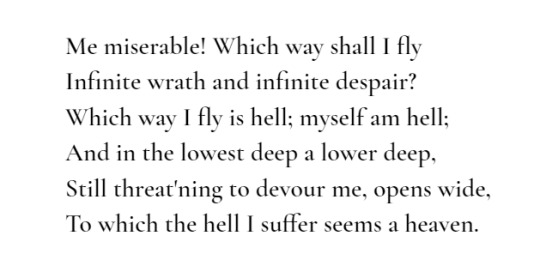
― John Milton, Paradise Lost
#poetry#dark academia#literature#english literature#quotes#poems and quotes#hell#john milton#paradise lost
287 notes
·
View notes